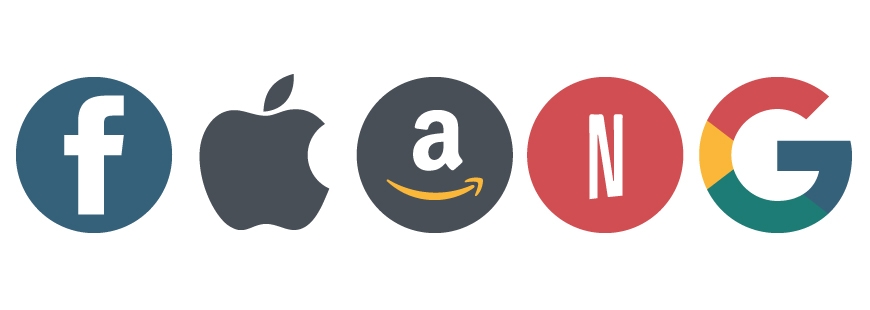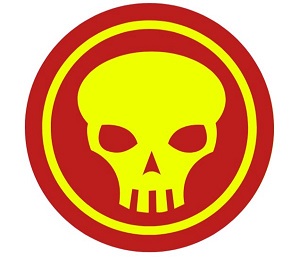Building a platform is difficult. It takes time, dedication, learning new skill-sets and a lot of sacrifice. To pay this price, and be successful, and then have some corporate goons shut you down, is a serious hazard in this strange new world we live in.
The Axis of Evil
Individual freedom has a new enemy, and it isn’t the government. This time it’s AFTGA [Apple, Facebook, Twitter, Google & Amazon.] Doesn’t matter what the political persuasion, if you can’t recognise how evil these mega-corporations have become, then something could be wrong with your brain. It might be the future, where corporations replace sovereign governments, but any artist or entrepreneur wanting to build a platform today would have to be crazy to use the legacy platforms if they don’t want to fall prey to these hyper-radicalised corporations.

The Alternative Challenge
The route to avoid this is harder than than using the mainstream internet, but in the end, if you seek to have your platform resistant to corporate thuggery, then try building it from scratch. Decentralisation is key, and the internet being the internet, provides ample alternative building blocks. It comes down to habits, so the best way to approach this is to try to change your normal routine with how you interact with the world wide web, by using alternatives for at least a year.
OS v OS
The first fence to jump would be the OS barrier. Using the Windows platform by Microsoft seems safe at the moment. Even though they push through updates that fuck up your user experience, they’ve never to my knowledge targeted users and tried to shut them down. Sure they steal your behavioural data, and pump out propaganda via their MSNBC outlet, but the risk of them stifling your platform is low. That’s why I haven’t included them as part of the Axis of Evil [yet]. No one really uses Edge browser. They can’t Skype you out of existence. But Bezos, Dorsey, Pichai and Cook can obliterate you out of existence if they target you. Zuckerberg seems to understand the potential for evil they are messing with, but the others don’t appear to give a fuck about the individual human being, they believe they are the sole moral authority. For any platform builder, even casual internet users for that matter, this is a bad thing.

If you really want to start from scratch, Linux-based operating systems are available that are now just as good as Win and iOS. There are heaps of Linux-based offerings, but Ubuntu is the way to go, but not absolute.
Browser War 2
The First Browser War was long and fought by various belligerents. Netscape, Explorer and then Google entered the battle. MS leveraged the dominance they had with their OS platform to become number one, but in the end Google’s Chrome eventually won, leveraging their success in the Search Algorithm Battle.
The Second Browser War has already began. Its now all about decentralisation and personal data. Google refuses to let go of their golden goose, so they won’t pay you for the data they skin off you. The alternative I find most likely to service every day browsing, just as a way to differentiate from your mainstream operations, is the Brave Browser.

With Brave, you can separate the old way of interacting with the internet (Chrome, Twitter, Facebook) and the new way, using only the alternative bookmarks with the Brave Browser.
Brave also monetises your data, giving you the choice to get paid for the data they (Brave) collect. Also a great introduction to cryptocurrency and the applied power of blockchain technology.
The Search Migration
When attempting research, the best way to ween yourself off Google Search, especially since they curate what information the algorithm delivers to you (i.e. blatant censorship) is using alternatives.
 |  |
DuckDuckGo at least promises to protect your privacy; uses the Yahoo algorithm, and attempts to give you the best result, as opposed to what Google wants you to discover.
Presearch is blockchain-based, therefore it pays you directly for the information it gets from you and offers multiple and custom search options.
privacy@email.com
There was a time in the late 90’s- early 2000’s when I was able to register over seventy free email accounts. kandiliotis@yawmail.com kandiliotis@start.com kandiliotis@mbox.com. There existed heaps of these. Now they’ve all vanished, only hotmail.com and gmail.com have remained the dominant providers of free service. They provide it free because they snoop through your private content and throw adverts at you.

Having road-tested heaps I’ve settled on Protonmail. It has a decent free plan, it’s encrypted by default, has solid free features, and is based in Switzerland. Oh, plus they don’t snoop on you.
It’s in the Cloud.
Cloud storage is handy, holy shit, it’s more than just handy. Having access to your data anytime and anywhere is the best, it’s revolutionary. But just like email, Google and Microsoft just love snooping around your stuff, and if they don’t like you, they can cut you off from your data and will. Dropbox and Box.com are also big-tech cronies who would do same if they all decide to come for you.

When Megaupload was shut down, like all disruptive technology, Kim Dotcom simply establish an another file sharing service, Mega.nz. Granted, it can be taken down, but only a government level attack could do it. As long as no laws are broken, I don’t see this happening. It’s encrypted, has neat features, and robust.
If you want more control; set up your own file server. Nextcloud and Owncloud are available, and with a bit of research and knowhow, are easy to install.


If you’re savvy enough, you can run these from home, but if you use a hosting service, make sure the servers are NOT reliant on Amazon’s AWS, otherwise they can and will shut you down.
Microblog: The News Revolution
Twitter is garbage. If you’re looking to have a meaningful conversation on a platform limited to 280 characters then give up. Its not going to happen. The only usefulness a micro-blogging site has is access to news. It bypasses legacy media choke-holds and gives you direct news, real-time, from the source.
Unfortunately, Jack Dorsey’s crew think its okay to appoint themselves as the morality police by curating what is and what is not news, or what is ethical and what is not. Or who is a good person and who is bad.
Fortunately, the market counterbalances this with competition.


And Freedom of Speech is the main marketing strategy, with both Parler and Gab dedicated to respecting the right for an individual to express themselves freely. As an artist or any platform builder, this is an important aspect. Getting your news out to the world should not be based around the morality and ethics of some Silicon Valley goon, but base around your own principles.
Social Freedom, or Death
Interacting with your fans or customers is a fundamental aspect to any platform. Whether the interactions are positive or negative, that is your business.

Minds and Hive are both blockchain-base solutions to social media censorship. They are user controlled with strong established communities, and they offer payment systems for content.

Blockchain Killed the Video Star.
Stay bland, avoid using an ever-increasing list of banned words, submit to an ever-subverted political correctness, and you will do fine on YouTube. The monetisation program they provide is easy bait, but you become enslaved to their ever-shifting values.
Blockchain offers solutions to grow your platform. It may be slow and meagre but crypto-currencies aren’t going to go away. They are maturing fast and will eventually dominated the Internet’s economy.
 |  |
Bitchute and LBRY are the main contenders. Decentralised, they provide a safer base of operations. Build an audience free of corporate interference.
Dtube gets an honourable mention because of… blockchain.
Patreonisation
When Patreon decided to de-platform customers, SubscribeStar said thank you very much. Russian-owned, there’s little chance they’ll bend to American corporate wokeness because, a] they actually want to make money, b] Russia is protected by nuclear weapons.

Locals is another subscription\social media platform that’s worth checking out.
Also, consider getting up to speed with cryptocurrency and blockchain technology, because legacy banks and Paypal have no qualms destroying you and your enterprise.
Beyond Distribution
AFTGA, especially Amazon, have a stranglehold on publishing whether it be books, music or movies. They can crush you on a whim. Paypal, who own eBay, Gumtree and other ecommerce big tech firms have proven they will shut you down if they don’t like you so, don’t rely on them. Alternative distribution outlets are hard to come by, but they do exist., for example; OpenBazaar.

Decentralisation is key. If you’re producing content, blockchain and torrent technologies have the ability to sucker punch these corporate leviathans, but that is a quest for another future post.






